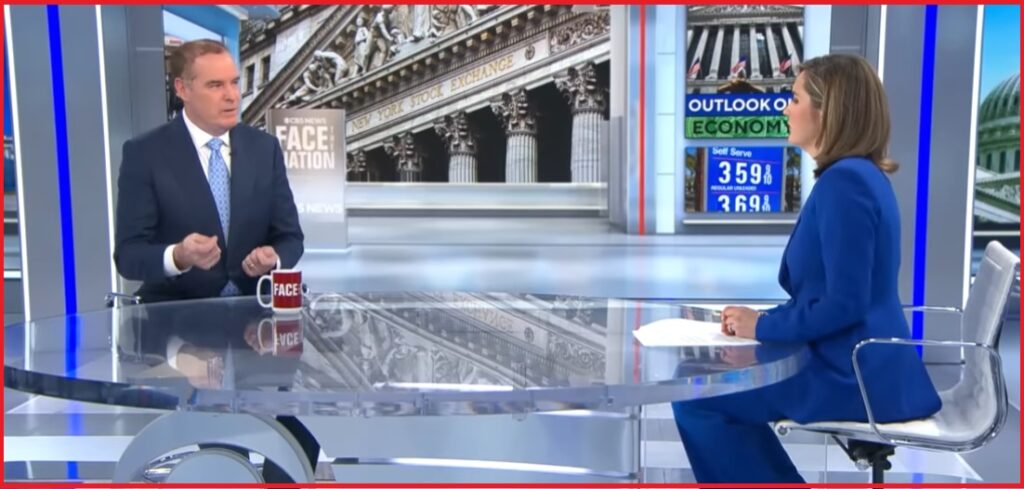[TRANSCRIPT] – […] BANK OF AMERICA CHIEF ECONOMIST MICHAEL GAPEN: Happy New Year as well. Thank you for having me on.
MARGARET BRENNAN: You know, a majority of voters polled by The Wall Street Journal say that the economy is going to look and feel worse in 2023. What is your forecast?
GAPEN: So I think that’s probably true. I think we’re in a situation where the risk of recession is high, may not be a deep and prolonged one. But we’re in a situation where the economy has recovered very rapidly from- from COVID, and it’s come with a lot of inflation. And the Federal Reserve is trying to slow down the economy, to bring inflation down. And in the past, more often than not, that’s coincided with some sort of recession in the US economy and the U.S. labor market. It’s not baked in. It’s not for certain. We may be able to avoid it, but I would agree that the outlook by most people who sit in the position that I do think 2023 could be a difficult year for the U.S..
MARGARET BRENNAN: So we may be able to avoid recession?
GAPEN: Yes.
MARGARET BRENNAN: Or it could be mild?
GAPEN: That’s right. So in the past, we have been able to raise rates, cool inflation, without pushing the economy into a recession. In the mid 1990s we were able to do it. It’s just that the path to that is very tricky and sometimes involves a little more luck than than it does skill. Many other times in the past, again, more often than not, when we’re tightening policy, pushing interest rates higher to slow down the domestic economy and bring down inflationary pressures, that often means we get a period of-of higher unemployment rates and what would be characterized as a recession. In this particular case, I think it doesn’t have to be deep. It doesn’t have to be prolonged. I think what we just need to do in some ways is take the edge off an economy that’s emerged from the pandemic with a lot of strength and brought too much inflation with it.
MARGARET BRENNAN: So we’re currently at an inflation rate of about 7.1%. There is, though, increased concern that that’s going to stay sort of sticky, stay where it is for a while. How long do we have to stomach higher prices? When does it feel better for the average American?
GAPEN: Well, I think we’re actually the evidence suggests we’re already past peak inflation. So the year on year rate of inflation should start to move lower. It already did towards the end of last year, and we think that will continue to happen. So right now, the trajectory is a more favorable one. It will probably take 2 to 3 years to get inflation back down to levels that we knew prior to the pandemic. In other words, low, stable and something we didn’t necessarily talk about because it wasn’t forefront on our mind. So I’d say directionally we’re headed in the right direction, but it may take another 18 to 24 months, maybe 36 months, to fully get us back to a situation where inflation doesn’t seem to be as pressing as it is today.
MARGARET BRENNAN: And that would get us to that 2% level that the Fed is targeting?
GAPEN: That’s right. So the Fed targets low and stable prices, low and stable inflation. They interpret that as roughly 2%. In essence, what they’re saying is we want inflation to be low enough where households and businesses don’t have to think about it when they’re making their their decision. So you and I aren’t here talking about inflation. So how low is low? That’s typically about 2%.
MARGARET BRENNAN: Although they admit they can’t control a lot of things at the Fed, like gas, like food prices.
GAPEN: Right.
MARGARET BRENNAN: Treasury Secretary Janet Yellen was recently quoted in an op ed that she- she penned as saying, times can be tough, but Americans are tougher. From the depths of the crisis. We have bounced back and the president’s economic plan has bolstered the US economy’s resilience to today’s global challenges. So that’s the political plan, the fiscal spending that Congress can- can help them out with. Do you think on that front, we are on a steady path forward?
GAPEN: I do. I think what we’ve seen, the change that we’ve seen from, say, the fiscal policy side of the US economy is one where industrial policy is creeping back in again, where we’re trying to align our public sector interests with our private- private sector opportunities, the CHIP Act and protecting the supply lines for- for chips, for example, is is one of those sectors-
MARGARET BRENNAN: For semi conductors.
GAPEN: That’s right. For semiconductors, for which is a hugely important process for electronics and autos globally. And second, the Inflation Reduction Act has many components of a clean energy policy. So I think from a medium term perspective, we’re seeing greater alignment again with political objectives, public sector objectives and then private sector opportunity. We haven’t done that in the United States for several decades.
MARGARET BRENNAN: But in terms of more support for those in the economy who are getting pinched the hardest right now, I mean, do you think that this is a time to pull back on fiscal spending? You know, the criticism after the fact was that the government pumped $6 trillion in two years and that added to to prices going up.
GAPEN: Right. And I would say the spending under the CHIPS Act or the Inflation Reduction Act isn’t, you know, it’s spread out over over many years. So I don’t really think it’s something that would be boosting the economy meaningfully in the short term. You’re right. A lot of the the legacy of prior fiscal policy is still on household balance sheets in the form of a lot of excess saving, and that is helping the economy to continue to grow and continuing momentum in the economy. So I do think it’s time where we, you know, from a public policy perspective are saying we need to take a step back a little bit. We need to moderate the economy and get rid of some of the inflation that that came about.
MARGARET BRENNAN: Tighten the purse strings?
GAPEN: That’s right. Yeah.
MARGARET BRENNAN: In your newsletter, Bank of America’s economists admit to to being wrong about 2022.
GAPEN: It happens.
MARGARET BRENNAN: But so were the central banks, as you all point out, central banks were about six months late in hiking interest rates, the Fed stands out like a sour thumb in largely dismissing the hardest labor market in many decades. So if if all the experts were wrong, why should the public trust that you’re on the right path now?
GAPEN: You know, I think that the narrative I would give is we- Public policy plan for the worst, hoped for the best with the pandemic and plan for the worst. So we didn’t get the worst outcomes of-of the pandemic. Right. Some of those that were predicted early on, but we put a lot of fiscal policy support in. We kept monetary policy easy and interest rates low. And we just we kind of got too much of a good thing coming out. So now we’re just we’re course correcting that. So, yes, we were wrong on how much inflation we- we got. We had to kind of keep revising up what what we were thinking. But now the idea is what? We just need to turn the needle a bit and bring it back down. So. But that’s not easy to do. It’s not easy. And it raises the risk of a recession, particularly in the labor market. But the right long term policy is to get inflation back down, Right? The policy mistake would be not addressing this. So it may mean some pain for the economy in the short run. But if the Fed is successful at bringing inflation down, that means it’s a very good outlook for the US economy over the medium term.
 MARGARET BRENNAN: But pain in the economy, I mean, let’s let’s say what that is. That’s likely job cuts.
MARGARET BRENNAN: But pain in the economy, I mean, let’s let’s say what that is. That’s likely job cuts.
GAPEN: Likely job losses yes.
MARGARET BRENNAN: There are 6 million unemployed people right now with a jobless rate about 3.7%. That’s a very strong jobs market. Right. Where do you think that jobless rate is going to go? How much pain are you preparing us for?
GAPEN: Right. Part of the problem in the in the labor market right now is lack of available labor supply. We do think for about three and a half to 4 million workers short of where we were prior to the pandemic because of things like lack of immigration and early retirement and so forth. So this is why if we want to, you know, reduce a hot labor market, cool it down a bit, it may involve some job losses. It could come in places like housing. The housing sector is retrenching. It could come in manufacturing the good side of the economy, which was strong in prior years. And it may come in in professional and business services and finance and other sectors like that. We will, of course, see and again, a recession is not guaranteed, but services inflation is strong. And typically the way you bring services inflation down is to cool the labor market.
MARGARET BRENNAN: But how severe? I mean, in terms of when we’re talking about people, Senator Elizabeth Warren has said the Fed is pushing hard to get more people fired. She called it extremist actions to raise interest rates. You’re characterizing this as necessary so that it doesn’t get worse.
GAPEN: That’s right. The–
MARGARET BRENNAN: But they are trying to get companies to stop hiring.
GAPEN: They are trying to reduce demand for labor. Yes. And- and it’s a fine line to walk on how much unemployment you might get out of that. The Fed’s forecast project, the unemployment rate could rise about a percentage point to about 4.6%. Private sector forecasters will range from maybe four and a half to five and a half. So that’s a big move from where we are currently. But the 20 to 25 year average unemployment rate in the U.S. is about 6%. So it would be kind of getting things back up to maybe a more normal environment, which would still be a pretty good labor market, just not as- as hot as it is today.
MARGARET BRENNAN: You know, you’re talking about going back to sort of standard models, but I think it’s really interesting what you said about retirements, that skilled workers took themselves out or left the workforce, maybe not by their choice, during the pandemic. We’re also seeing, in particular in child care, a severe shortage of workers. And that’s driving up the cost of child care as well. When do those dislocations get any better? Because those are hard things to make up for.
GAPEN: They are. They typically take years to- to make better. And sometimes it involves changes in, say, fiscal policy or the public policy aspect, not necessarily monetary policy. The Fed can induce labor- labor supply, but things like provision of health care or universal pre-K, right? Some of these elements in what was the Build Back Better agenda could be things that induce participation, right? Make it easier for parents, mothers and fathers, to participate in the workforce. But these things take- take time. And inflation is high now. And- and the risk is that what appears or should be a temporary, several year, increase in inflation turns into something that’s more prolonged. So the Fed really can’t wait for that.
MARGARET BRENNAN: Excuse me. I’m just going to take a sip of water.
GAPEN: I will, too.
MARGARET BRENNAN: I have a catch in my throat. So let’s just pick up here. When you talk about monetary policy, you’re talking about what the Fed can do.
GAPEN: That’s right.
MARGARET BRENNAN: For consumers, when the Federal Reserve keeps rates higher for an extended period of time. For folks who don’t watch Jerome Powell as closely as you and I do, they see the impact in their credit card statement or in the mortgage rate if they want to go out and buy a new home. When those Fed moves go up, the cost likely will go up for those other things as well. So if someone’s looking at the housing market, wants to go out and buy a home right now, do they also have to wait the 2 to 3 years you referenced for inflation to come down before they feel like they can afford it?
GAPEN: Well, housing is under a tremendous affordability shock right now. As you know, home prices nationally are still up about 40% relative to pre-pandemic times and–
MARGARET BRENNAN: There’s a bubble.
GAPEN: Well, I–
MARGARET BRENNAN: Jerome Powell said it was a bubble.
GAPEN: Well, okay. I would disagree with- with that. And mortgage rates are high. They’re- They were over 7%. They’re now above 6%. So, yes, I think the- home prices are starting to come back down. But, yes, it will take time to cool down the housing market and return affordability. Is it- Is it two years? You know, I don’t know, but it could be 12. It could be 12 months. Could be 24 months. Yes. The housing market currently is- is in its own recession at present. Activity has really slowed down, particularly as mortgage rates rose. It’s one of the most interest rate sensitive sectors in the U.S. economy.
MARGARET BRENNAN: You also, on a global scale, have to take into account some of those shocks. War in Europe. China reopening with its going from COVID zero to an influx of cases potentially of COVID infections. How do you account for that?
GAPEN: Well, I- I’m actually a little benefitted by being the U.S. economist because we’re still a large, relatively closed economy. Those shocks elsewhere tend to affect us less and in some ways the weaker the rest of the world is, the better it is for the U.S. because soft growth globally tends to bring down energy prices. And we’re seeing that now. Gasoline prices, prices at the pump are, you know, around where they were prior to Russia’s invasion of Ukraine that actually supports consumer spending. So outside of that, though, certainly weaker growth means we have fewer places to export. So it weighs on growth through our trade channel. China’s reopening may actually start to push commodity prices higher. So it is, you know, it’s an all intricately linked system. And we just do our best to try and understand where these forces are at any point in time. But from the perspective of the U.S., we’re- we’re generally domestically driven, services oriented, domestically driven. Weakness in Europe or changes in China’s outlook, they don’t affect us all that much. It’s really about the domestic economy. And in fact, where are labor market conditions? Is the labor market hot? Does the labor market need more support?
MARGARET BRENNAN: I want to end on a positive note, if we can. I want to ask where you see sort of the best news in 2023. What makes you hopeful?
GAPEN: What makes me hopeful is not just in the U.S., but globally, central banks have gotten the message on inflation. They reacted very quickly. Inflation is now on- on a downward trend and we think that will continue. So we think we’re kind of past the peak worry in terms of- of inflation. And I suspect we will have this conversation less and less going forward. At least that’s certainly the hope. And the other area I would say is I’m still very optimistic about the long run prospects for the U.S. economy. And in that regard what I mean is, in a world where, you know, we’re pulling back from globalization a bit and we’re fracturing a bit, and- and it’s more about spheres of influence and major economic powers operating in their region.
MARGARET BRENNAN: You’re talking about China without saying China.
GAPEN: Yes and Russia. But also there’s a surge in Brazil and India. There’s a lot more players on the scene than there was in the past. And in a- if the world is breaking up a little bit, I think the positives of the U.S. actually become more positive. The U.S. becomes a better place for investment, returns to capital and the dollar’s strength in the world system will likely be preserved. So in some ways I think our positives become more accentuated in the current environment. So we’ve got a problem with inflation now. We will likely risk recession in 2023. But beyond that, I think it’s still a very positive outlook for the U.S.
MARGARET BRENNAN: All right. Thank you so much for sharing your outlook. [End Transcript]

The U.S-China dynamic is going to be very critical this year. PRO TIP – Anything sourced from China is going to be scarcer and more vulnerable to disruption. If you are associated with an industry that is dependent on Chinese goods, even as an employee – watch out. China’s manufacturing and distribution is going to be extremely sketchy due to severe domestic issues associated with COVID mitigation amid their vulnerable population. This is going to make the U.S and Canada issues with Mexico even more important.











